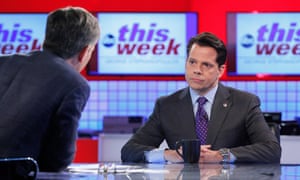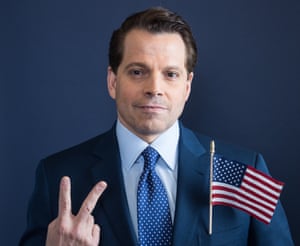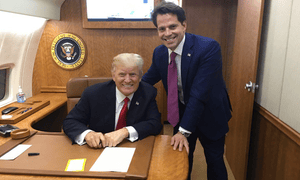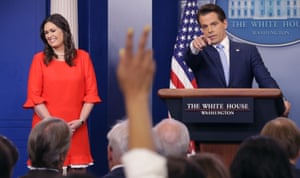“He is,” one of Anthony Scaramucci’s colleagues tells me when I arrive at his office, “about as politically incorrect a person as you are ever likely to meet.” I think she means this as a compliment; it’s hard to say. I turn to Scaramucci. Would he agree?
“Donald Trump,” he suggests, “is probably slightly less politically correct than me. But I mean, why would you be politically correct? It’s very boring.” Scaramucci slides a hand into his suit trouser pocket. “You know what I am? And don’t forget this about me. I’m a member of the green party.”
He pulls out a silver clip of $100 bills and holds it up to show me. “See the green, OK?” He fingers the fat roll of dollars. “That’s the green. I’m a member of the green party.” There must be at least $2,000 in his hand. “I don’t know,” he shrugs. “Is that a lot? I don’t count it.” What is he doing with all that money? “Italians carry cash. You never know, you may need it for something. Always have a lot of cash on me, always. Why not?”
But why? “What, do you think I’m leaving flimsy tips? If you’re parking my car, I’m giving you $100. Because I want to be able to walk out the place and I want to be able to roll right in the car. I’m not waiting in line. I’m giving you $100. Plus, you’ve got to understand, I came from blue-collar workers. My father used to park cars.” Scaramucci studies the cash in his palm again. “For me, this is like, I may need the money for something. Who the hell knows.” He shoots me a sharp look. “Don’t get me robbed, though. You write that shit in the Guardian, you’re going to get me fucking robbed.”
For 11 memorable days last summer, this was the man the president employed to be his communications director. By then America was beginning to adjust to the volatile new White House cast; following Sean Spicer’s surreal tantrum about the size of Trump’s inauguration crowd, many reporters thought themselves unshockable. But the appointment of Trump’s old pal from Long Island produced political theatre unlike anything Washington had ever witnessed.

In Scaramucci’s own words, earlier this year, it was “absolute berserkazoid craziness: internecine warfare, leaks every 13 seconds… total chaos in the White House, total disorganisation”, during which he publicly threatened to “fire everyone”. The world watched agog; it was as if The Sopranos had taken over The West Wing. Just five days into his job, Scaramucci brought the curtain down by phoning a CNN journalist to accuse Trump’s chief of staff of “cock blocking” him, call him a “fucking paranoid schizophrenic” and declare “I’m not Steve Bannon, I’m not trying to suck my own cock”, unaware that the call was being taped. The profane rant made headlines across the world, and Scaramucci was fired.
Now back in New York, managing the $12.5bn hedge fund he founded in 2005, he swivels in his chair to beckon a colleague. “Sue, come here for a second. You cash that cheque for me? The journalist is asking me why I have so much money on me. Why do I have so much money on me?”
Another colleague, Brett, appears. “Because he’s Italian.”
“Did you see that?” exclaims Scaramucci, delighted.
“Twenty-seven years ago,” Sue reminds him, “it used to be fives and tens in the wallet.”
“Yeah, but he always had the $100 on the outside,” teases Brett.
“Sue, let’s tell the total truth here.” Scaramucci is looking happier and happier. “They were singles, weren’t they? And then there was one hundred wrapped around the singles, right?”
“You had nothing back then,” Sue agrees, handing him a white envelope stuffed with a new sheath of crisp $100 notes. He needs more? “Sure,” purrs Scaramucci. “Maybe a little more.”
Brett asks me who I work for. “It’s like a communist magazine,” Scaramucci says. Brett gestures to my Dictaphone and asks: “Is that still on?” I nod. He throws Scaramucci a quizzical glance. “I see: going on tape worked out so well for you.”
“Well when I know I’m on tape it goes well,” Scaramucci flashes back. “But when someone’s taping me, and they know me, and they’ve known my family for 50 years, and then they run to CNN… ” The sentence trails off into silence, his contempt unutterable, before he brightens and nods at me. “But she’s been very honest. She put the tape recorder right in my face. I admire that.” He glances at his watch. “I’ve got to go.” But I’ve been here barely 10 minutes, I point out. Can I come along? “Come on. You’re having a lot of fun. You know, I’m a lot of fun to hang out with.”
The SUV waiting outside is driven by a heavyset, crop-haired man in a shell suit. “John, how many years have you worked with me?”
“Too long,” growls the driver.
Scaramucci laughs. “He’s been with me 21 years. And Sue there, it’s been 27 years. You know, we like collecting people, taking care of people.”

Weaving through the Manhattan traffic, we head to a TV studio, where Scaramucci will record a slot on Comedy Central’s satirical talk show The Opposition with Jordan Klepper. Seldom off the airwaves these days, the 54-year-old reels off his extensive transatlantic media appearances with gladiatorial pride (“I love Piers [Morgan]! I’ll get up at 1.40 in the morning to be on the guy’s show”). At the studio he will repeat this list to production staff, and pose for selfies next to his name on his dressing room door. (He is equally happy to pose for selfies with anyone we pass who asks, and his enthusiasm for a camera lens will be evidenced again during the photo shoot, when he produces a guitar and flashes Churchillian V-signs). Our interview will continue in the green room, resume again on the backseat of the SUV and continue along a Midtown sidewalk, ending at the door of his restaurant, where he must meet a client for dinner. Were it up to Scaramucci, I think the interview might still be going now.
I have never met anyone who enjoys being interviewed more. He needs an audience like the rest of us need oxygen, and the compulsive exhibitionism is equalled only by the sumptuous pleasure he takes in his own performance. A banker who used to work with him on Wall Street described him to me as “insecurity on legs”, but despite the transparency of his neediness I do not think I have ever met a man more at ease with himself. Quick-witted, funny, fabulously good company, he wants so badly to be liked that it would be impossible not to oblige.

The puzzle is why he likes the company of journalists. Remarkably, Scaramucci’s enthusiasm for media coverage appears undiminished by the frequency with which it backfires, as if each time it goes wrong were the first. When he tells me about a recent Washington Post report of a talk he had given, he looks authentically incredulous. “I said to my friend, is this what I sounded like? It was like the exact opposite. The reporter wanted to caricaturise me. She wanted to make me into some narcissistic buffoon. So much Italian-American stereotyping by the press.” He shakes his head sadly. “I couldn’t believe it.”
Scaramucci was working for Goldman Sachs in 1995 when he first met Trump. I ask him to recall his initial impression. “Well, that was a very impressionable time for me. I didn’t see the inside of a commercial office building until my call-back interview with Goldman Sachs. Remember, I grew up on Long Island.” Scaramucci reminds me so frequently, it is unlikely I’ll forget. One of his favourite questions, which he asks everyone we encounter, is “Where did you grow up?” and by a bit of luck, my answer – rural Wiltshire – delivers the desired cue.
“Then you’re a lot like me! You don’t really give a shit about all this class status. My father worked as a blue-collar guy. My dad had a lunch pail, I never played golf, I never played tennis. So this?” He gestures around the hedge fund boardroom. “Not my natural habitat. That’s why I don’t give a shit, right? I could go to my home town, wear a white T-shirt, open up a can of beer and watch a baseball game just as easily as I can traffic in the nonsense around politics or the economy or Wall Street. Because that’s how I grew up.” And what did he make of Trump, I remind him? “Oh, I remember being very impressed. I’d read his book The Art Of The Deal. Very impressed.”
Scaramucci initially backed Scott Walker and then Jeb Bush for the 2016 Republican nomination, before joining the Trump finance committee, and then the president-elect’s transition team. In Michael Wolff’s book Fire and Fury he is described as a “constant hovering – even lurking – presence in Trump Tower”, cravenly angling for a job in the new administration. “The Mooch,” Wolff writes, “might not have been the most peculiar volunteer in the Trump run for president, but many figured him to be among the most shameless.”
“Total falsehood. I would say 65% of that book was false,” he exclaims indignantly. “It’s a Steve Bannon position narrative. I call it Liar And Furious. Liar is Michael Wolff, and Furious is Steve Bannon. Adolf Bannon, I call him.”
If relations with Bannon (at the time Trump’s chief strategist) were already strained when Scaramucci became communications director, with others they were even worse. Trump’s then press secretary, Spicer, resigned in protest at his appointment, and Scaramucci accuses the president’s then chief of staff, Reince Priebus (“I call him Rancid Penis”) of waging a vendetta against him.
“I knew that guys like Priebus and Bannon absolutely didn’t want me in the job. They were using their oppositional research forces and they were leaking like crazy on me. You can look up, from 21 July to 31 July there were 180 negative stories written about me, anonymously sourced from the White House. So they were coming after me as hard as they possibly could. One hundred per cent, they were disasters. They were vipers living in a vipers’ nest. It was constant oppo-drops against me.”
Oppo-drops? He looks surprised that I’d need to ask. “An oppo-drop is when I do a whole opposition research file on you – I find something nefarious in your background – and then I’m going to hand this oppo-dossier to a journalist, right?” For example, Scaramucci’s second wife filed for divorce, nine months pregnant, a week before he became communications director. Four days into the job, he missed the birth of their second child and was famously reported to have texted her: “Congratulations, I’ll pray for our child.”

“That text message is ridiculous! Totally fabricated. I didn’t say that to my wife. That was an oppo-drop. Priebus and his Republican party friends were trying to destroy me in the world of public opinion.”
The job can’t have been much fun, then. “Don’t get me wrong, I totally enjoyed myself. Very much so. I’m just explaining to you that that’s Washington. That’s how they operate. They try to caricaturise you, and dehumanise you, so that you lose your voice. They wanted to get me by grinding out a public image of me that is dramatically different from the reality.”
I tell him I’m a little confused, because to me the chief author of his public image – brash, aggressive, Italian-American – appears to be him. “You know, someone said to me, and it’s a great line, ‘People say you’re very smart, but you only have one gear in your transmission.’ And I’m willing to accept that. Because how are you going to get from the neighbourhood I grew up in to here? You’re not going to get here soft pedalling.”
So he didn’t want to disabuse people of their prejudices? “Why would I? I don’t need to do that. Shakespeare said life is a stage, right? Well, I’m just going to play myself.”
Unfortunately for Scaramucci, he imagined himself off stage when he made his fateful late-night call to the New Yorker writer and CNN pundit Ryan Lizza. He began the call by demanding Lizza reveal his sources within the White House, then threatened: “What I’m going to do is, I will eliminate everyone in the comms team and we’ll start over.” After an expletive-laden rant about Priebus and Bannon, he declared, “What I want to do is I want to fucking kill all the leakers.”
How the White House’s communications director could have made such a recklessly sensational call, let alone neglected to stipulate that it was off the record, is a mystery I try my best to fathom. Was he sober when he called? “Stone-cold sober. I don’t drink, you can ask anybody.” Has he ever been in therapy? He shoots a wary look. “What do you mean by therapy?”
Well, a psychoanalyst would probably interpret the call as the act of a man whose unconscious hated his new job, and wanted to get himself fired. “More oppo-drop nonsense!” he erupts. “Listen, Ryan’s father Frank has worked with my father on Long Island construction for 50 years. The families have known each other for 50 years, so I thought it was a safe call. I didn’t think Ryan Lizza – who grew up in my neighbourhood, grew up in the Italian Long Island cultural community, whose parents were also in construction – was going to violate me like that. I thought I was picking up the phone and talking to somebody from my neighbourhood.”
As Scaramucci strikes me as neither naive nor sentimental – and because he barely knew Lizza – this explanation feels unconvincing, but he refuses to entertain any other. “‘I had to be drunk.’ Totally not true. ‘It was a Freudian oh-my-God-get-me-out-here, let-me-call-Ryan-Lizza-to-self-detonate thing.’ Not at all. I’m fully accountable for the mistake I made.”
He could not be more emphatic. Yet in the hours we spend together, the only time I see him rattled is when denying that his unconscious could have played a part. “It was not,” he insists repeatedly, “a Freudian slip.” How can he be so sure? “No way. I’m a personality. I’m in the game for a fight. I love the fight.”

He maintains he will never forgive Lizza for reporting their conversation the following day. Priebus was forced to resign a day later, and within another 48 hours the new chief of staff, John Kelly, had persuaded Trump to fire his communications director, too. I wonder if Scaramucci felt the president had any choice.
“OK, well. If I’m going to be on the other side of the firing, I’m firing Anthony because he’s not ready for prime time. The fact that he thought that this kid Lizza wasn’t going to do that to him is a sign that he’s not ready. This is Major League, the pitches are coming in very fast.
“Or… you could have said, this guy worked with me for two years on the campaign, donated to the campaign, he’s very loyal. Let’s give him a break, he’s going to come up the learning curve very quickly.” He straightens, pulling his shoulders back. “But Kelly used it as a way to fire me, and Trump backed him, so that’s fine.”
Was it fine, really? “What I’m not going to do is lose my relationship with him over a firing. Why would I do that?”
In the television studio, I watch Scaramucci deliver a witty, likable, unexpectedly credible defence of the president to an audience who almost certainly does not support Trump, nor ever will, and will make no material difference to Scaramucci either way. Having returned to his hedge fund after leaving the White House, he is responsible for managing the fortunes of the super rich, has reconciled with his wife (the divorce was dropped last November), and with two young sons plus three adult children from his first marriage, Scaramucci has more than enough on his plate without finding time to talk to the media. If he hates the world of Washington politics half as much as he likes to say, I’m not sure why he keeps taking the time and trouble to talk to the media about it, so I ask him why he agreed to give the Guardian an interview.
“You guys are probably very liberal. Probably hate Trump. Well, I like going into the enemy territory. I don’t have a problem with it.” A thought occurs, and his eyes narrow. “Why did you want to meet me? Because I’m a funky character, right?”
Actually, I was hoping he could help us better understand the man America chose to be their president. We never stop hearing about Trump from his critics, I point out, most of whom have never met him. This is an opportunity to learn from someone who really knows him, and I’m curious to know whether Trump wants to be loved, or feared.
“Well, you’re using a machiavellian quote, but it’s a little bit more complex than that. I think that he wants to be respected, which is different than being loved or feared. I think at the end of the day, the reason why you go from Queens and Brooklyn, developing residential property, to Trump Tower in Manhattan, is that you’re trying to make a breakout in your career. You’re trying to live on a bigger stage – and so that’s respect. It’s not necessarily fear. I think it’s respect.”
What about love? “I think that he’s ambivalent. I think there are times when if you asked him that, he would say that he wants to be loved, and there’s times you’d ask him that and he’d say he doesn’t care. And he’s telling the truth both times. It’s case by case.”
For example, he explains, Trump wants to be loved when he’s fighting an election, but couldn’t care less if everyone hates him for moving the US embassy in Israel to Jerusalem, or pulling out of the Iran nuclear deal. “I think if your readers are trying to box the president, and trying to create this superficial personality analysis of him, boy, they’re going to miss everything, because he’s an incredibly complex guy.” He casts a wolfish grin. “He does it to them on purpose, by the way. He’s pushing Trump Derangement syndrome. That’s part of his strategy.”
Every time liberals erupt in scandalised uproar at his latest misspelt, grammatically anarchic, exclamation-mark-riddled tweet, they like to think they’re sneering at Trump – but according to Scaramucci the joke is on them, because Trump knows exactly what he’s doing. “It’s deliberate and self-aware, 100%.” So Trump’s Twitter persona is a calculated piece of performance art, barely recognisable to anyone like Scaramucci who knows the real Trump?
“It is a combination of his personality, and performance art. When he is saying ‘My button is bigger than your button’, the first call for me is to Don Jr and we spend 10 minutes laughing about it. I mean, it’s just absolutely totally him and it’s vintage stuff. He’s very funny. And a lot of the jokes about him make him laugh. He doesn’t like showing it, for some reason, but the stuff about his hair? He loves that shit.”
So he isn’t at all insecure about his hair? “Nooooo. Come on.” What about the hands? This time Scaramucci sounds a fraction less confident. “I don’t think he’s insecure about his hands. I think he finds that funny as well.” He pauses for a moment. “I mean, look, here’s the thing – you know, he can be brittle. If he’s getting hit, he gets very sensitive, his skin breaks easily. There’s a brittleness to him. But then, the flipside is he’s like the toughest person that I know, that can take on anybody. He’s like a human Pac-Man. He’ll eat anything in his way.”

He clearly finds Trump’s attitude to the press, and to women, less amusing. Looking uncharacteristically uneasy, he concedes, “I could do without the Mika facelift comments,” referring to the president’s infamous tweet about the MSNBC TV anchor Mika Brzezinski “bleeding badly from a face-lift”. Scaramucci wrinkles his nose in distaste. “I don’t think that those are appropriate. And I could do without the hitting of [the New York Times reporter] Maggie Haberman.” Trump recently attacked her coverage with a series of tweets dismissing her as “a third-rate flunkie”. “You’re living in a society that’s got a free press,” Scaramucci says. “You’re the leader of the free world. You can’t ad hominem attack journalists.”
But I’m not sure exactly what he means, moments later, when he calls Trump “the progenitor of the #MeToo movement”. I’m still not clear after he tries to explain. “Well, we think he’s done nefarious things that we don’t like. We can’t get to him, so we’re going to blow up everybody in the society that has a micro or macro aggression against women.” Scaramucci shares this view? He looks momentarily thrown. “Do I?” Yes. Does he personally believe Trump did things to women for which he should be held accountable? After an uncomfortable pause, he says: “It doesn’t really matter what I think. He can’t be gotten to. He’s an elected official and he’s unindictable as it relates to the constitution.” But I’m not interested in what the constitution says; I’m interested in what Scaramucci thinks. After another uncharacteristically uneasy hesitation: “Yes. No. I mean, look, I don’t know. I don’t know what he’s done or hasn’t done. I’ll leave that up to him and his wife.”
Such modest self-doubt about the significance of his personal opinion vanishes, never to resurface, the moment the conversation moves on. Scaramucci is currently writing a book, The Blue Collar President, about the ethos – if not genius – of the president’s management style, which fits neatly into his self-appointed unofficial role as Trump’s media ambassador. Part cheerleader, part translator, the financier’s media persona is surprisingly winning, and his political punditry, although obviously partisan, conveys just enough critical distance to persuade some viewers to reappraise their president.
Scaramucci has made himself much more useful to Trump than he ever was in the White House. I try to work out whether his media charm offensive is motivated by selfless patriotic duty, or opportunistic self-interest, but the answer turns out to be more primitively powerful than either: his pride. What he wants, even more than Trump’s gratitude, or celebrity status, is to be taken seriously.
“What the media likes to do,” Scaramucci explains, “is say ‘Let’s build a shame box for this person. We’ve shamed them out of Washington, and now they’ll go away and never be heard from again.’ But I like being myself, and so I have a voice, and so I like sharing my voice, sharing my opinion. You can like my opinion or dislike my opinion. You could think it’s too aggressive or not aggressive enough. I actually don’t care. I’m healthy. I’ve got a great family. Why do I care? You watch what I do with this. These guys accidentally made me very famous. Now I have a voice and a national platform. Watch what I do with it.”
What is he doing with it? “A number of things. The first thing I want to do is, we’re going to raise our profile and do some strategic things related to the opioid crisis. Because I come from a family that has drug- and alcohol-related issues. And I have a platform now to regrow my business. I have a platform to write. I feel like I’m a very blessed guy. I wake up in the morning with a tremendous amount of gratitude. I’ve got beautiful children and I’ve got an interesting, fun life. I’m not going to be down about it.”
On the street outside his restaurant, I ask if he would work for the president again. “I think it’s a 0.0% chance that he would ever ask me. But would I be involved in politics at some point in my life again? Probably, probably.” I’m turning to leave when he calls after me.
“The money thing. You know, the cash I carry. Can you not mention that?”
“But it was my favourite bit!” I call back, and see anxiety melt away into gratified delight.
“Really? Oh, OK. Then maybe just make the amount a bit lower? Just a tiny bit.”
• Commenting on this piece? If you would like your comment to be considered for inclusion on Weekend magazine’s letters page in print, please email weekend@theguardian.com, including your name and address (not for publication).